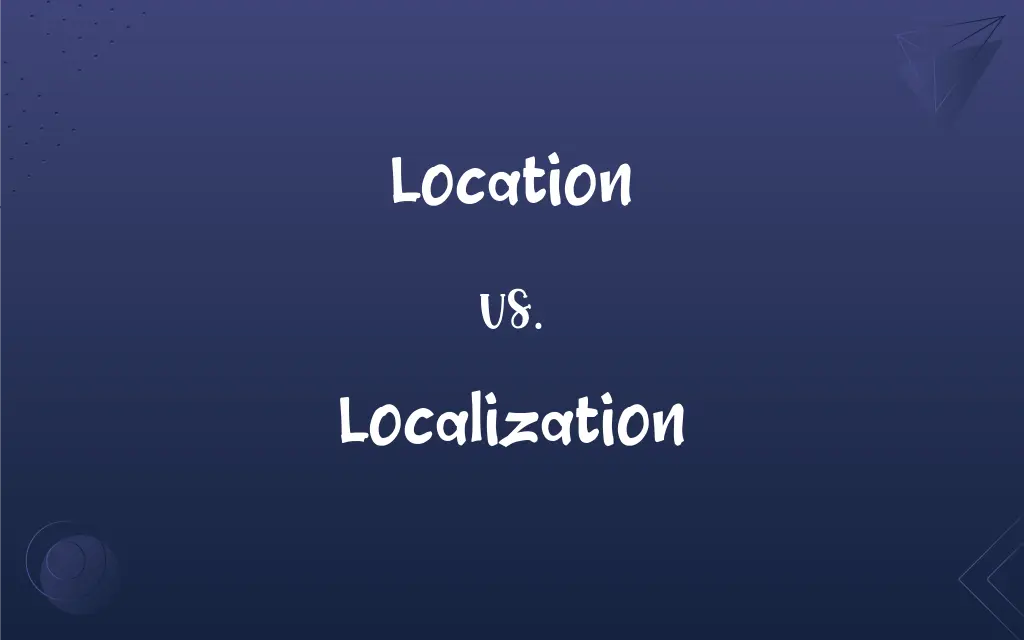Location vs. Localization: What's the Difference?
Edited by Aimie Carlson || By Janet White || Updated on October 11, 2023
Location refers to a specific place or position. Localization involves adapting a product or content to fit a particular local market or culture.

Key Differences
"Location" often simply refers to a place or position, which is integral to our understanding of physical space. Meanwhile, "Localization" delves into adapting content, products, or services to align with specific local markets, reflecting cultural and linguistic nuances.
In terms of geographical referencing, "Location" gives us a point of reference, a physical position that is defined in terms of coordinates or descriptive landmarks. Contrarily, "Localization" is not bound by physical aspects but rather is related to adjusting specifics to suit the local audience or environment, which may include translation and cultural adaptation.
It's notable that "Location" provides us with a concept that's static, a fixed point, or area that doesn’t change, acting as a straightforward descriptor. "Localization," however, is a dynamic process, an action of making something local in character or more suitable for a particular locale, which can involve multiple aspects including language, culture, and functional modifications.
Whereas "Location" tends to be a concept that is universally understood and requires little interpretation, "Localization" might require comprehensive understanding and thorough research into the locale it aims to adapt to, considering linguistic, cultural, and other local nuances to be effectively executed.
"Location" can be applicable in various contexts like geography, technology, and more, often without needing extensive specialized knowledge. "Localization," however, often requires expertise in multiple areas such as language, culture, technology, and regulatory compliance to ensure that the adapted product or content is both accurate and resonant with the local audience.
ADVERTISEMENT
Comparison Chart
Basic Definition
A place or position.
Adapting something for a specific local market.
Contextual Usage
Often used in geographical contexts.
Primarily used in adapting content or products.
Involvement
Does not involve a process or adaptation.
Involves a process of adaptation and modification
Relation to Culture
Generally not directly related to culture.
Involves adapting to cultural and local nuances.
Static vs. Dynamic
Static, indicating a fixed point.
Dynamic, involving an ongoing adapting process.
ADVERTISEMENT
Location and Localization Definitions
Location
A point or place in geographical terms.
His location was undetermined after he turned off his phone.
Localization
The act of adapting something to a local culture or market.
Localization of the software meant translating it into several languages.
Location
A site or setting of an event or activity.
The concert location has been changed due to the weather.
Localization
Modifying a product to be suitable for particular locales.
The localization process improved sales in international markets.
Location
A specified place or position.
My current location is at the downtown café.
Localization
Adjusting to meet the specific needs of a local area.
The company invested in localization to enhance user experience.
Location
The act of determining where something is.
Location of the missing item took several hours.
Localization
The determining and indicating of a particular place or position.
Localization of the fault was crucial to resolving the network issue.
Location
A designated area chosen for a specific reason.
This beach is a popular location for weddings.
Localization
To make local
Decentralize and localize political authority.
Location
The act or process of locating
Location of the lost hikers took two days.
Localization
To confine or restrict to a particular locality
Localized the infection.
Location
A place where something is or could be located; a site.
Localization
To attribute to a particular locality
Sought to localize the origin of the rumor.
Location
A site away from a studio at which part or all of a movie is shot
Filming a Western on location in the Mexican desert.
Localization
To become local, especially to become fixed in one area or part.
Location
A tract of land that has been surveyed and marked off.
Localization
The act of localizing.
Location
A particular point or place in physical space.
Localization
(software engineering) The act, process, or result of making a product suitable for use in a particular country or region.
Location
An act of locating.
Localization
The act, process, or result of adapting translated text to fit a local culture; domestication.
Location
(South Africa) An apartheid-era urban area populated by non-white people; township.
Localization
The state of being localized.
Location
(legal) A leasing on rent.
Localization
(algebra) A systematic method of adding multiplicative inverses to a ring.
Location
A contract for the use of a thing, or service of a person, for hire.
Localization
(algebra) A ring of fractions of a given ring, such that the complement of the set of allowed denominators is an ideal.
Location
The marking out of the boundaries, or identifying the place or site of, a piece of land, according to the description given in an entry, plan, map, etc
Localization
Act of localizing, or state of being localized.
Location
(Kenya) An administrative region in Kenya, below counties and subcounties, and further divided into sublocations.
Localization
A determination of the location of something;
He got a good fix on the target
Location
The act or process of locating.
Localization
(physiology) the principle that specific functions have relatively circumscribed locations in some particular part or organ of the body
Location
Situation; place; locality.
Localization
Tailoring content or products to align with specific cultural nuances.
Effective localization considers both language and cultural norms.
Location
That which is located; a tract of land designated in place.
Location
A leasing on rent.
Location
A point or extent in space
Location
The act of putting something in a certain place or location
Location
A determination of the location of something;
He got a good fix on the target
FAQs
How does "Localization" relate to language?
"Localization" often involves translating and adapting content to make it suitable and relatable for a specific language and culture.
What does "Location" fundamentally mean?
"Location" fundamentally refers to a specific place or position.
Is a "Location" always physical?
No, a "Location" can also refer to digital or virtual places, such as a position in a data structure or a web address.
Is "Location" only used in a geographical context?
While commonly used geographically, "Location" can also refer to a point in a virtual space or other specified contexts.
How is "Location" typically determined or identified?
"Location" can be identified using coordinates, addresses, or relative descriptions.
What is "Localization" in the context of business?
In business, "Localization" involves adapting a product or content to fit a particular local market or culture.
Can "Localization" affect a product’s design?
Yes, "Localization" can influence product design to ensure it aligns with local tastes, norms, and regulatory requirements.
Why is "Localization" important for global businesses?
"Localization" ensures that products and content are culturally and linguistically appropriate, enhancing appeal and usability in various markets.
What are the challenges of "Localization" in advertising?
Challenges may include accurately translating messages, adhering to local cultural norms, and navigating regulatory frameworks.
Does "Localization" involve changing the functionality of a product?
Sometimes, "Localization" may include modifying functionalities to comply with local norms or regulations.
How does "Localization" impact software development?
In software development, "Localization" may involve modifying interfaces, adapting content, and ensuring compatibility with local formats and standards.
Can "Location" refer to a virtual place?
Yes, "Location" can refer to a virtual place, such as a website address or a digital platform.
Can "Location" influence business decisions?
Yes, the "Location" of resources, customers, and competition can significantly influence business strategies and decisions.
Is "Localization" only concerned with language adaptation?
No, besides language, "Localization" also considers other factors like culture, legal norms, and user behavior.
How does "Localization" relate to global marketing strategies?
"Localization" ensures marketing strategies are tailored and relevant to local audiences, respecting their language, culture, and values.
How is "Location" used in the context of social media?
On social media, "Location" may refer to geotagging posts or checking into physical places to share one's whereabouts.
Can "Location" refer to a conceptual space in discussions?
Yes, "Location" can refer to a conceptual space, such as a position in a debate or a point in a logical argument.
What is a "Location" service in technology?
A "Location" service in technology involves providing users with services based on their geographical location, often via GPS.
How can "Location" be shared using technology?
"Location" can be shared via various technologies, including GPS and IP addresses, often through digital maps or apps.
What role does "Localization" play in e-commerce?
In e-commerce, "Localization" helps tailor online shopping experiences by adjusting languages, currencies, and products to align with local preferences and regulations.
About Author
Written by
Janet WhiteJanet White has been an esteemed writer and blogger for Difference Wiki. Holding a Master's degree in Science and Medical Journalism from the prestigious Boston University, she has consistently demonstrated her expertise and passion for her field. When she's not immersed in her work, Janet relishes her time exercising, delving into a good book, and cherishing moments with friends and family.
Edited by
Aimie CarlsonAimie Carlson, holding a master's degree in English literature, is a fervent English language enthusiast. She lends her writing talents to Difference Wiki, a prominent website that specializes in comparisons, offering readers insightful analyses that both captivate and inform.
































































